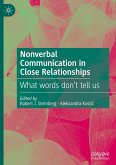Diploma Thesis from the year 2009 in the subject Psychology - Developmental Psychology, grade: 1,3, Johannes Gutenberg University Mainz (Psychologisches Institut), language: English, abstract: Compersion designates empathy and happiness for the partner on a relationship level. Whereas most people can be happy for the partner in a new job which satisfies him/her much more than did the old one, or for the partner meeting a good friend, a lot of people would negate being happy for their own partner finding someone else to love - and doing it. Compersion is often described as the opposite of jealousy, with jealousy being a more common reaction to the partner meeting a new love. The term compersion has been discovered within the American polyamory movement which subcribes to a relationship orientation that includes several intimate, consensual, responsible, and long-term relationships in which all relationship partners know of one another and/or are familiar with each other. In our time, serial monogamy is the most common relationship practice. It includes exclusive relationship rights and agreements. It comes with the cost and benefits of letting the other partner be the "only one" until the next only one comes along or of cheating on the partner, if the love to someone else starts. Usually this new love is suppressed, because it is assumed that the old partners must part ways as soon as someone new comes along. Loving several people at a time is a taboo, which is why polyamorous people often face social marginalisation in everyday life, being treated prejudicially or ostracised. The relation between compersion and jealousy is an often dicussed topic in the polyamorous community as every individual perceives it differently. Therefore, a lot of equally valid and parallel views exist. Some, for instance, have had the experience of compersion replacing jealousy, some see it as a reminder of some deeper propensity in themselves or of their relationship being out of balance, others have never experienced jealousy themselves but only through their partners' reactions. A lot agree that jealousy is a cultural construct learned in early life, which can be overcome, and that it should be regarded as an important signal. Furthermore, there is general consent among polyamorous people that it should not be cultivated to become a persistent part of their relationship, as they see it as an expression of a proprietary hold on them.
Hinweis: Dieser Artikel kann nur an eine deutsche Lieferadresse ausgeliefert werden.
Hinweis: Dieser Artikel kann nur an eine deutsche Lieferadresse ausgeliefert werden.








